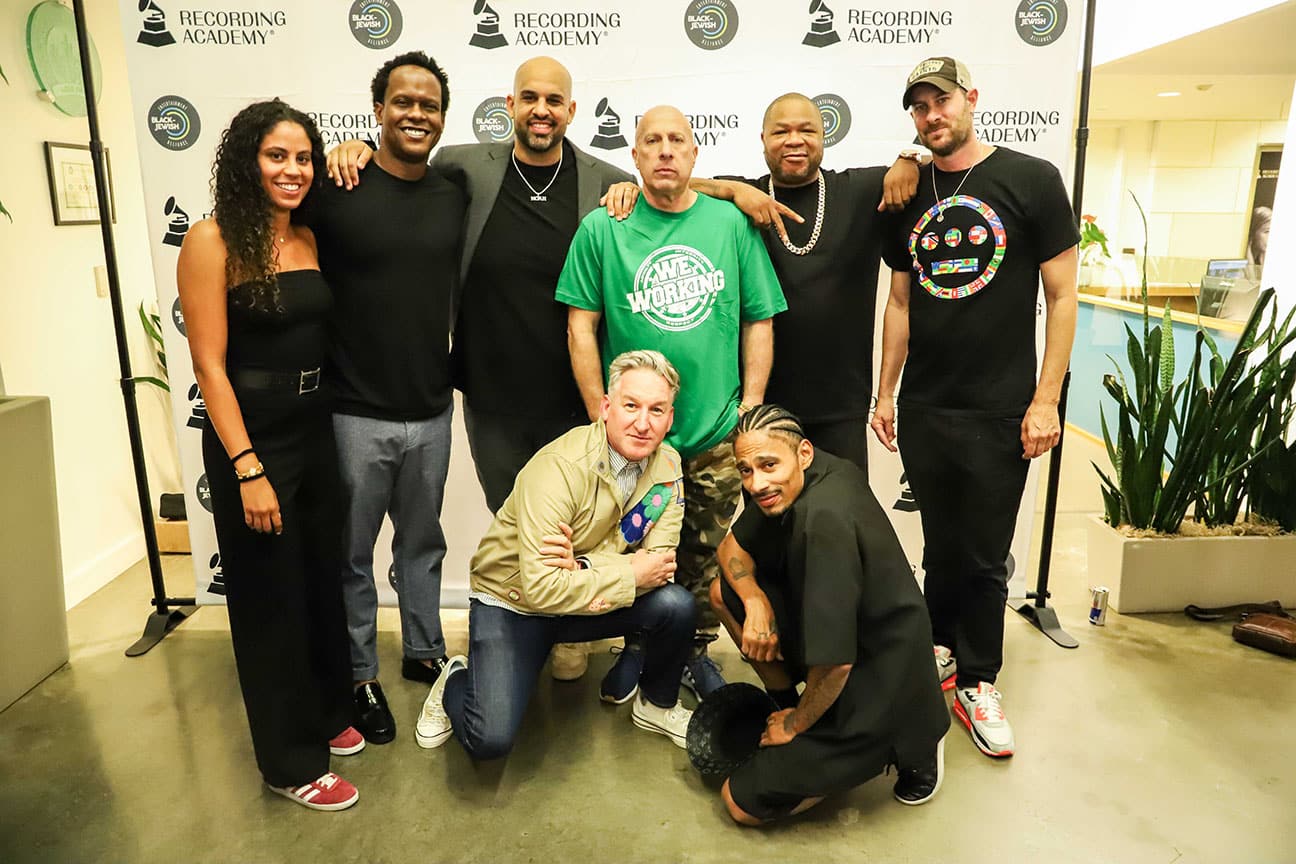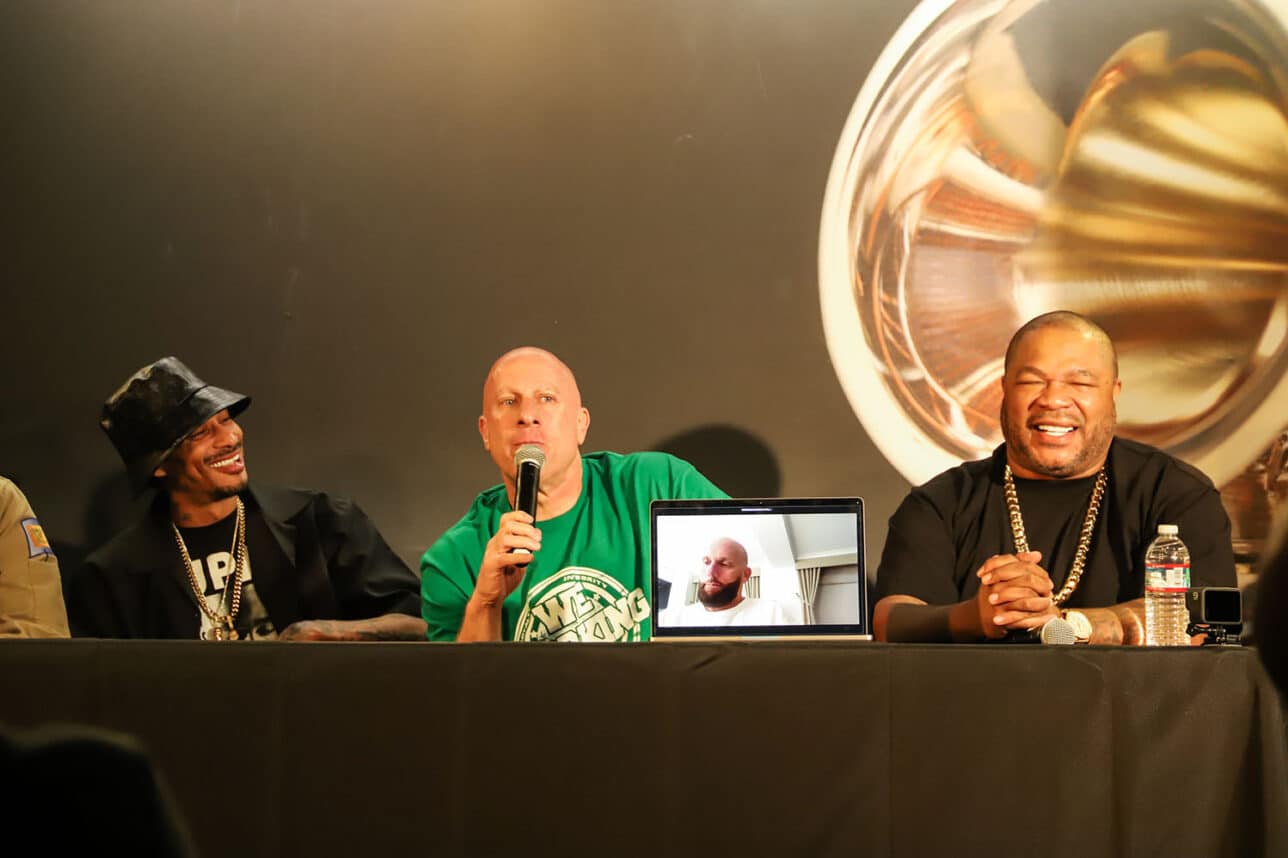 Standing, from left to right: Bianca Tomash, Justin Hunte, Cory Litwin, Steve Lobel, Xzibit and Ari Ingel. Kneeling, from left to right: Mazik, Layzie Bone. (Photo credit: Daniel J. Sliwa)
Standing, from left to right: Bianca Tomash, Justin Hunte, Cory Litwin, Steve Lobel, Xzibit and Ari Ingel. Kneeling, from left to right: Mazik, Layzie Bone. (Photo credit: Daniel J. Sliwa) Some of the biggest names in music gathered on September 14th to celebrate the 50th anniversary of hip-hop and to recognize the role of Black and Jewish collaboration in the flourishing of the genre.
The event was hosted by the Black Jewish Entertainment Alliance (BJEA), an organization founded “to bring the Black and Jewish communities together in solidarity, to support each other in their struggles, and to better understand each other’s plight and narratives.”
The night was highlighted by a panel of Black and Jewish music industry bigwigs speaking to a crowd of nearly 100 people at the The Recording Academy headquarters in Santa Monica. On the panel were rap artist and actor Xzibit, rap artist Layzie Bone from Bone Thugs-N-Harmony and MC Mazik, the CEO of Beatclub and one half of the now-disbanded hip-hop duo Blood of Abraham.

Joining them was longtime hip-hop manager and entrepreneur Steve Lobel, the CEO of A2Z Entertainment and weworking. Lobel is best known as the manager for Bone Thugs-N-Harmony, and for his work with Run-DMC, Eazy-E, Missy Elliot, Fat Joe and the late Nipsey Hussle. Loud Records founder Steve Rifkind joined the panel remotely. The panel was moderated by music and culture critic Justin Hunte.
“Hip hop would not be where it is today if it wasn’t for Black and Jewish communities coming together, and we wanted to highlight that in tonight’s panel discussion,” said BJEA member and 2wenty2wenty Music Group founder and CEO Cory Litwin in the opening remarks of the night.
“Hip hop would not be where it is today if it wasn’t for Black and Jewish communities coming together, and we wanted to highlight that”- Cory Litwin
By the end of the 90 minute discussion, the attendees understood the lesson of the night: Collaboration is the key to success and unity makes you stronger. The superstars on the panel spent much of the time sharing stories of collaboration far beyond racial and religious divisions as they rose to the top of the industry.
“There’s so many artists out there that think they could do it themselves because there are other artists out there saying, ‘I’m independent, I do it myself,’” Well, guess what? None of ’em do it by themselves. Not one person here is successful just because of themselves. If you want to build a real legacy as an artist, you need a team, you need a manager, you need a payroll manager, a tour manager, you need a lawyer, a business manager, an agent. I started by carrying bags for Jam Master Jay.”
Throughout the evening, Layzie Bone (born Steven Howse) interrupted Lobel, commenting on his 30 years in the music business with Lobel.
“What kept me engaged in music was somebody that cared about my career even more than me,” Layzie Bone said. “Steve Lobel cared. That’s what makes him a manager. Not because he is just a good motherf—er with a couple dollars. It’s because he really, really cared about the artists he worked with.”
Lobel responded, “I want to say this, this is my brother for real. We call ourselves Steve and Steve, but it is very uncommon that a white Caucasian Jew is with an Afro-American group for 30 years.”
“Now you want to get us canceled?” Layzie Bone interrupted, which drew the biggest laugh of the night from the crowd, before Lobel reiterated that together, they’ve “been through hell and back.”
MC Mazik, born David Saevitz, spoke about how in 1993, Blood of Abraham was signed by the late Eazy-E’s label Ruthless Records. He told the story about how Blood of Abraham filmed a music video for their song “Stabbed At The Steeple” at The Kotel, Haifa and parts of Syria — in what might have been the first hip-hop video ever filmed in Israel. Mazik also told the story of how back in Los Angeles, Eazy-E took them to the Slauson Swap Meet to get their baseball hats embroidered with Hebrew.
The crowd skewed quite young — many in attendance were recording artists in their early-mid 20s who relocated to Los Angeles to pursue a career in music. And it’s precisely events like these that BJEA members hope will be impressionable to the future leaders and superstars throughout the entire entertainment industry.
“There’s a growing opportunity for the entertainment community to do more to bring both the Black and Jewish communities together in the collective fight against racism and antisemitism,” BJEA member Ari Ingel told the Journal. Ingel is also the director of Creative Community for Peace.
Earlier this summer, BJEA members gathered for a much more solemn experience: A tour of the Holocaust Museum LA. Among the BJEA members who participated in that tour in June were Ingel, Ritza Bloom (writer at AppleTV+), Craig Emanuel (a partner at Paul Hastings LLC), Benjy Grinberg (founder and president of Rostrum Records) actor Dulé Hill and David Zedeck (Global Co-Head of Music at United Talent Agency). Litwin, who opened the Hip-Hop 50 event, also went on the Holocaust Museum LA tour.
Following the tour, the BJEA members reflected together on the history and trauma of the Holocaust, shared individual stories and spoke of their own struggles in the fight against antisemitism and racism.
“Visiting Holocaust Museums is emotionally difficult, but necessary,” Litwin told the Journal. “I left the museum with a renewed and reinvigorated sense of commitment. Commitment to do what I can to continue the fight against antisemitism.”
Litwin told the Journal about why the BJEA’s mission means so much to him.
“The BJEA hits incredibly close to me as I’m Jewish, my wife is Black, and my son is Black and Jewish,” Litwin said. “To advocate for a brighter future for both Black and Jewish communities, we must bolster and fortify our relationships with one another. This can only be done through hard work, education, listening, and honesty. As members of the entertainment community, I hope that we can use our platforms to effectively combat antisemitism and racism. Because when we’re unified, as one collective force, driven by our commonalities, we’ve accomplished extraordinary things.”























 More news and opinions than at a Shabbat dinner, right in your inbox.
More news and opinions than at a Shabbat dinner, right in your inbox.